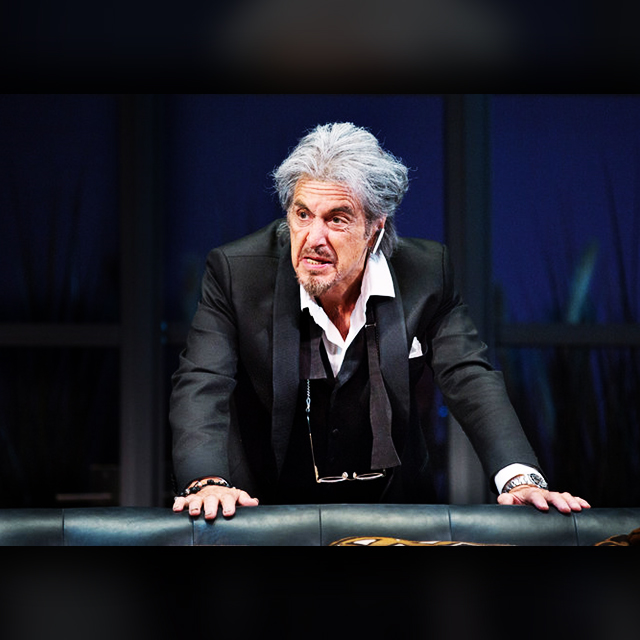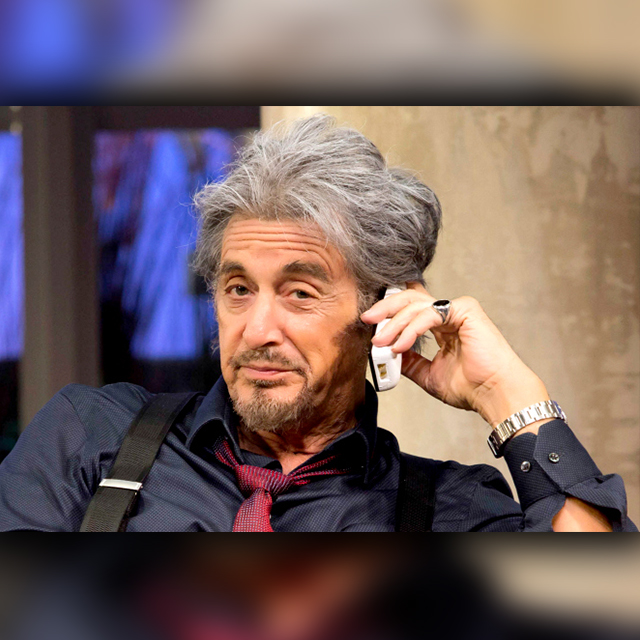The New York Times has posted a review of David Mamet's "China Doll," which just opened for a limited run at the Gerald Schoenfeld Theatre on 45th Street, and the review rips Pacino's performance apart.
Comparing Pacino's performance to "sound effects of chalk scratching on countless blackboards and the ping, ping, ping of an endlessly dripping faucet" the review gets more and more unkind as it gets deeper into the performance.
"Mamet is one of the few living American playwrights whose names have sexy marquee appeal. As for Mr. Pacino, he’s one of the last of a breed of scenery-munching titans who came of age in the 1970s, sons of Brando who turned Method into irresistible madness both on screen and onstage. Mr. Mamet and Mr. Pacino have been around long enough that baby boomer ticket buyers (and they’re the ones with the dough) remember when these guys were the coolest, gutsiest cats in the room. And even before “China Doll” went into previews, loyal fans turned the show into a box-office hit.
But even with weekly grosses exceeding a million dollars, “China Doll,” which is directed by Pam MacKinnon (a thankless task), soon found itself being circled by theater vultures for whom the scent of disaster is an aphrodisiac. The word was that Mr. Pacino couldn’t remember his lines and that audience members were walking out in baffled annoyance at intermission. The show’s original opening night was delayed by about two weeks, and Mr. Mamet was said to be rewriting copiously.
The “China Doll” that has now been deemed fit for public consumption would seem to be a classic Mametian study of competitive, clumsy men behaving badly to one another. Like his first big stage success, “American Buffalo” (in which Mr. Pacino memorably appeared in 1981), this latest offering features a blustery older guy who is (or thinks he is) a master of the art of the scam and his eager and naïve young mentee. Granted, the stakes are financially higher than they were in “American Buffalo,” in that our older guy is no small-time grifter but one of American’s richest wheeler-dealers, a maker of kings in business and politics.
One of the biggest problems (though not the only one) in comprehending “China Doll” is that Mr. Pacino’s lurching, stammering performance is not easy to follow in terms of content, character or subtext. There has been more than enough evidence in the past to certify that Mr. Pacino is a bona fide genius, so let’s assume that there are reasons for what he’s doing here.
What that is might strike some as the simulation of dementia. And it could be argued that “China Doll” is a portrait of the Mamet-style scrappy urban warrior in winter, who has reached the age when a blustering nonstop show of virility requires more energy than he can now muster.
Mr. Pacino plays Mickey Ross. We deduce that he is really rich in that he has the money to buy the big, sleek airplane that is the subject of many arcane phone conversations in the first act. He inhabits what looks like a custom-designed beach house in the Hamptons or Malibu, though it turns out to be (I think) a Manhattan apartment. (Derek McLane did the set.)
Besides, he’s wearing a tuxedo, so he must have just come from some fancy gala. Yet Mickey wears black tie as if it were the rags of a bag man. His clothes, his hair, his posture all seem to be in a state of not just disarray but deliquescence. He’s melting before our eyes. And he talks with the distracted, potholed speech of someone who doesn’t know where his next word is coming from.
Yet when those words assemble into semi-coherent shape, we are asked to infer that Mickey is one tough kahuna, someone with the power to dictate to corporations and governments. When we first meet him, he’s on the phone, dickering over the details of his recent purchase of the aforementioned plane, in which he plans to fly with his much younger, British fiancée to London.
But, aah, the obstacles that are being thrown in the way of Mickey’s will, which you assume has seldom been thwarted. It seems there are problems with taxes on the plane, partly because of the numbers painted on its tail, and partly because it touched down on American soil when it was being flown to Canada, where Mickey’s fiancée is waiting.
Did you get that? I may have it wrong. You’re on your own in assembling the pieces of this particular subplot, as Mickey — assisted by his mostly silent personal assistant, Carson (Mr. Denham) — juggles assorted phone conversations, on a Bluetooth clip. We gather he is talking to, variously, that lovely young fiancée; a Swedish plane manufacturer; a lawyer, and someone he calls Ruby, a former crony who is close to the Governor of the state, whose father (a former Governor) was Mickey’s mentor.
There's more It's brutal. It makes you wonder if Pacino should have just disappeared after The Godfather (1 and 2), Serpico, Dog Day Afternoon and Scarface. Oh yeah. I liked Carlito's Way. That was pretty bad ass, too.













